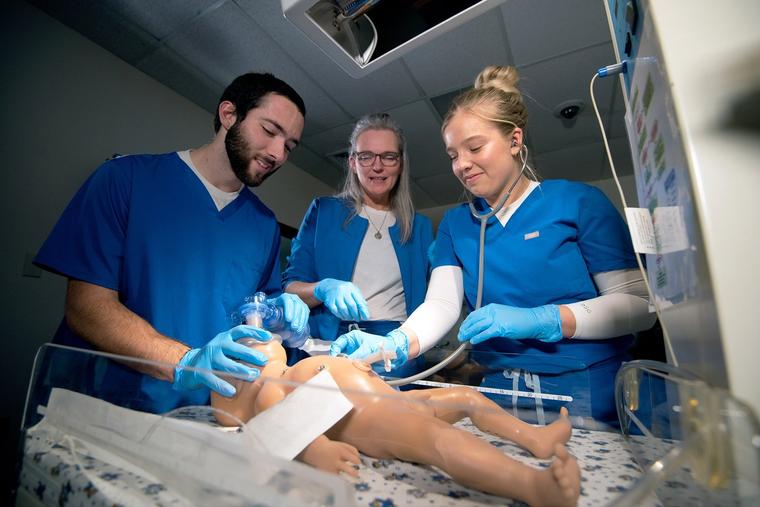After Roe v. Wade, Catholic Colleges Prepare Pro-Life Nurses
Many graduates of faithful Catholic schools have gone on to become pro-life leaders in the medical fields.

Many people are asking, “What’s next for the pro-life movement after the overturning of Roe v. Wade?” One strategic answer coming from faithful Catholic colleges is to populate the medical field with more pro-life, ethical leaders.
More than half the colleges recommended in The Newman Guide offer nursing programs, and some also prepare students for other medical careers. These are colleges rooted in the truth of human dignity and Catholic moral teaching, and already many graduates have become pro-life leaders in the medical fields.
Now that commitment to pro-life healthcare is growing, with several exciting, new programs.
The University of Mary in Bismarck, North Dakota, recently announced its tuition-free Nursing Academy for select full-time freshmen. This is a tremendous opportunity for students to earn a highly-rated nursing degree in a little more than 2.5 years at a university that prioritizes Catholic social teaching, bioethical principles and moral advocacy. Students also benefit from the University of Mary’s core curriculum and rich sacramental life.
“It is tremendously important to us that students in the health professions receive specialized education … not only to become exceptional and skilled providers in their chosen fields, but also exemplars of moral courage, defenders of the sanctity of life and dignity of the human person,” said Dr. Mary Dockter, dean of the Saint Gianna School of Health Sciences (SGSHS), which is dedicated to the patronage of pro-life St. Gianna.
This generous opportunity is possible because of a partnership with Sanford Health, America’s largest rural health system with 47 medical centers across the Midwest, and support from CHI St. Alexius Health, the nation’s third-largest nonprofit health care network across 18 states.
“Embedded in the curriculum [for the Nursing Academy] is an all-expense paid pilgrimage to Italy, Germany and France in which they can walk in the footsteps of Saint Gianna and our Benedictine founders, discuss the tragedies that occurred with medical experimentation in the Second World War and witness the miracles that occur in Lourdes — all under the umbrella of the dignity of the human person,” Dr. Dockter said.
At Belmont Abbey College in Belmont, North Carolina, a new hospital is being built adjacent to campus by CaroMont Health. The regional provider will develop cooperative programs with the college, supporting Belmont Abbey’s new bachelor’s degree in nursing, RN to BSN program, Master of Science in Nursing Leadership and Master of Health Administration. And because the hospital is leasing land from the Benedictine monks who live there, the hospital is committed to Catholic healthcare guidelines, including no cooperation with abortion, sterilization, euthanasia or assisted dying.
“Belmont Abbey College provides a holistic approach that integrates medical discipline with a foundation in the liberal arts and sciences and Catholic health care ethics,” said Sarah Bolton, a marketing project manager at Belmont Abbey College.
Dr. Carolyn Harmon, Belmont Abbey’s Dean of Nursing further explains, “Our nursing department is a member of the National Association of Pro-Life Nurses. One of our nursing professors, Melissa Horstman, helped create the first chapter of the National Association of Catholic Nurses in North Carolina.” Additionally, the college’s bioethics instructor, Dr. Gina Noia, is also available for consultation with Abbey students.
In addition, Benedictine College in Atchison, Kansas, will be playing no small part in the future of pro-life medical professionals. The college announced last year that it plans to establish a new, independent medical school that “understands the essential role of faith and morality in the sciences.”
And in the meantime, Benedictine is already contributing to forming pro-life medical professionals through its biology, pre-med, and nursing majors. The nursing program is housed in the Mother Teresa Center for Nursing and Health Education, and the College promised Mother Teresa’s order, the Sisters of the Poor, that Benedictine would remain committed to being a pro-life nursing school.
Nursing students take courses on bioethics, and on fertility-based awareness/natural family planning. The Nursing School has an annual White Mass for Nursing students, a student-led Bible study, guest speakers on pro-life issues, and are planning an annual retreat.
Fighting laws has been and will remain a powerful part of the pro-life movement, but being pro-active and strategic going forward will not only be a requirement but the most effective form of evangelization. The important work of faithful Catholic colleges to build up pro-life medical professionals should be celebrated and supported!
Kelly Salomon is director of Newman Guide programs at The Cardinal Newman Society.















